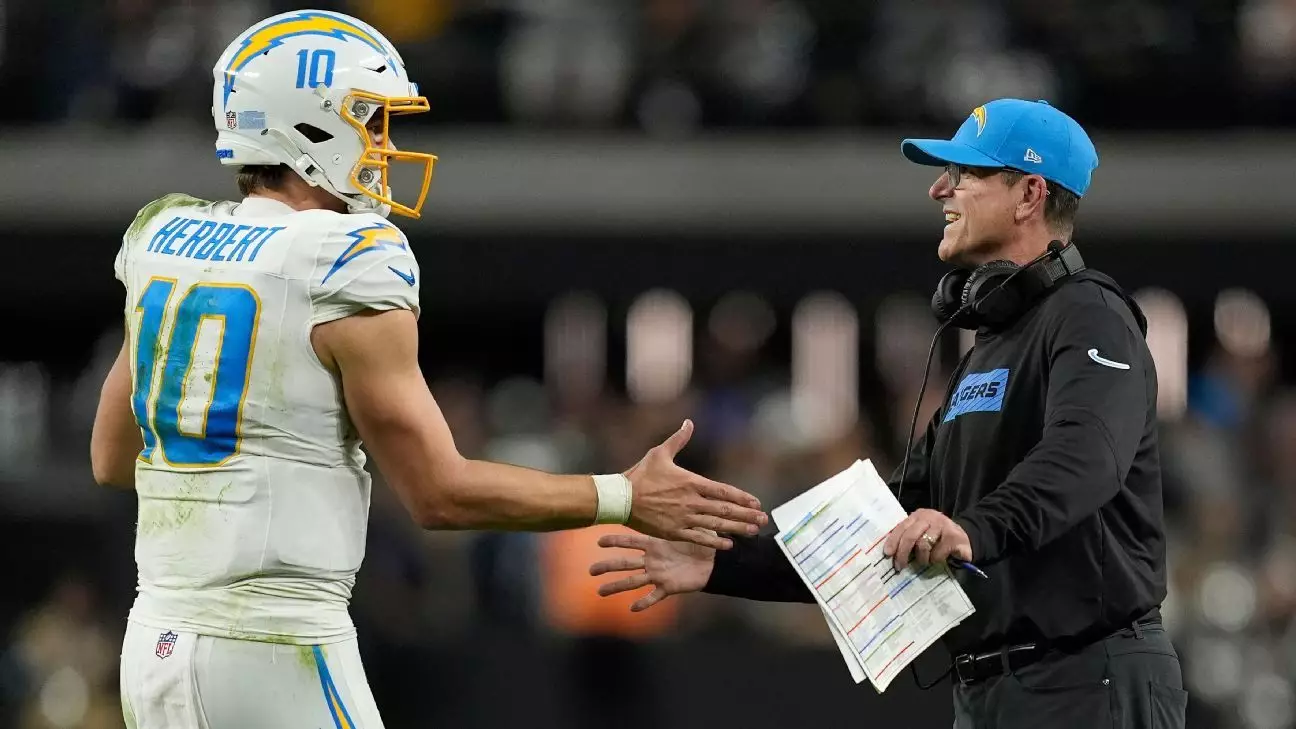The narrative surrounding NFL quarterbacks often hinges on their ability to perform under pressure, particularly in playoff scenarios. The recent performance of Los Angeles Chargers quarterback Justin Herbert is a poignant example of this expectation, as his team faced a devastating 32-12 defeat against the Houston Texans in the wild-card playoff round. This match marked one of the lowest points in Herbert’s career, punctuated by a staggering four interceptions, leaving fans and analysts scrambling to discern the root cause of his struggle.
In the aftermath, head coach Jim Harbaugh openly took responsibility for the game plan, asserting that Herbert was not placed in favorable conditions to thrive. His admission—”We did him a disservice”—captures the complicated nature of responsibility in team sports, where the interplay between coaching strategies and player execution often dictates the outcome. Herbert, who had the league’s lowest interception rate during the regular season, was seemingly upended by factors that transcended individual performance.
The game showcased an alarming deviation from Herbert’s usual composure and decision-making skills. A critical moment came early in the second quarter; leading 6-0 and positioned in the red zone, Herbert attempted a risky cross-body throw—a choice that, while ambitious, proved disastrous as it was picked off by Kamari Lassiter. This underthrown pass highlighted the tension between risk-taking and caution—a balance that is particularly precarious in playoff environments where the stakes are heightened.
As the contest progressed, Herbert’s performance deteriorated. He threw a high ball that landed in the hands of Eric Murray, resulting in a pick-six that chronicled Herbert’s struggle to read the field effectively. His inability to fine-tune his throws under pressure highlighted not only his individual failings but also the inadequacies of the offensive line. With 18 pressures on 36 dropbacks and four sacks to contend with, it was clear that the protection offered to Herbert was far from sufficient. This raises an essential question: how much can be attributed to the quarterback’s performance versus systemic issues within the team?
Indeed, Herbert’s final statistics—14 completions on 32 attempts, resulting in a completion percentage of 43.8%—underscore a significant fall from grace. Such numbers not only placed him in dishonorable company among previous Chargers quarterbacks but also cemented a worrying statistic: a quarterback throwing more playoff interceptions than during the regular season is an anomaly, speaking volumes about his struggle that night.
In the days following the loss, criticism against Herbert intensified. The weight of expectations is a double-edged sword; while it can propel players to greatness, it also subjects them to scrutiny when they falter. Herbert’s previous playoff outing—a dispiriting loss after holding a 27-0 lead against the Jacksonville Jaguars—further complicates public perception. Fans and analysts alike began to question whether Herbert is truly equipped for the playoff stage, an inconvenient narrative that often overshadows his undeniable skills and accomplishments.
Amid the shadows of critique, Chargers general manager Joe Hortiz came to Herbert’s defense, emphasizing the importance of perspective. Drawing parallels between Herbert’s situation and the early playoff careers of legends like Peyton Manning and Lamar Jackson, he argued that judging a quarterback solely based on a handful of playoff games is shortsighted. Just as these great quarterbacks developed over time, so too should the narrative around Herbert evolve.
As the Chargers reflect on this disheartening playoff outing, it is imperative that they dissect both individual and team performances critically. For Herbert, this loss may serve as a crucible to refine his skills and mental resilience. The Chargers must also recalibrate their approach to safeguarding their franchise quarterback from relentless pass rushes and optimize their offensive strategies to enhance his effectiveness.
The playoff journey is unforgiving, often revealing the frailties of even the most talented athletes. For Herbert, it is now a matter of overcoming pressures and expectations while plowing through the lessons learned from these early playoff experiences. The pathway to playoff success is often marked by trial and error, but one thing remains certain: Herbert’s potential is vast, and the NFL landscape can be unforgiving, yet it is also ripe with opportunities for redemption.


Leave a Reply